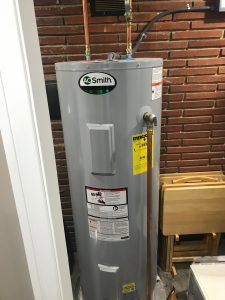A Step-By-Step Guide For Common Water Heater Problems
A Step-By-Step Guide For Common Water Heater Problems
Blog Article
We have stumbled on the article on Common Problems with Your Home Water Heater down the page on the internet and decided it made perfect sense to share it with you on this site.

Envision starting your day without your regular hot shower. That already sets a bad tone for the rest of your day.
Every residence needs a reputable water heater, however just a few recognize exactly how to manage one. One easy means to maintain your hot water heater in top form is to look for mistakes frequently and repair them as soon as they appear.
Remember to shut off your hot water heater before smelling around for faults. These are the hot water heater faults you are more than likely to experience.
Water as well warm or too chilly
Every hot water heater has a thermostat that determines how warm the water gets. If the water entering your residence is too warm regardless of establishing a hassle-free optimum temperature, your thermostat could be malfunctioning.
On the other hand, also cold water may result from a stopped working thermostat, a broken circuit, or incorrect gas flow. For instance, if you use a gas hot water heater with a busted pilot light, you would certainly get cold water, even if the thermostat remains in best problem. For electrical heaters, a blown fuse might be the perpetrator.
Not enough hot water
Water heaters been available in lots of sizes, depending on your warm water demands. If you lack hot water before every person has had a bathroom, your water heater is also small for your family size. You need to take into consideration installing a bigger hot water heater container or selecting a tankless water heater, which takes up less space as well as is a lot more durable.
Odd noises
There are at the very least five kinds of sounds you can hear from a hot water heater, but the most typical analysis is that it's time for the hot water heater to retire.
First off, you must recognize with the regular seems a water heater makes. An electric heating unit may appear various from a gas-powered one.
Standing out or banging audios typically mean there is a piece of sediment in your containers, and also it's time to cleanse it out. On the other hand, whistling or hissing noises may merely be your shutoffs letting some stress off.
Water leakages
Leaks can come from pipes, water connections, valves, or in the worst-case scenario, the storage tank itself. With time, water will wear away the storage tank, and also locate its escape. If this takes place, you require to change your water heater immediately.
Nonetheless, prior to your change your entire container, make sure that all pipes remain in area and that each valve works flawlessly. If you still require aid determining a leak, call your plumber.
Rust-colored water
Rust-colored water suggests one of your water heater parts is rusted. Maybe the anode pole, or the tank itself. Your plumber will be able to recognize which it is.
Warm water
No matter exactly how high you set the thermostat, you will not get any type of warm water out of a heating unit well past its prime. A hot water heater's effectiveness may minimize with time.
You will likewise obtain warm water if your pipelines have a cross connection. This implies that when you activate a tap, hot water from the heating system streams in alongside regular, cold water. A cross connection is very easy to place. If your hot water faucets still follow closing the hot water heater valves, you have a cross link.
Discoloured Water
Corrosion is a significant source of dirty or discoloured water. Deterioration within the water storage tank or a falling short anode pole can cause this discolouration. The anode rod protects the tank from rusting on the inside and ought to be examined yearly. Without a pole or an effectively functioning anode pole, the warm water quickly rusts inside the storage tank. Get in touch with a specialist water heater professional to identify if replacing the anode pole will certainly take care of the issue; otherwise, replace your water heater.
Conclusion
Ideally, your water heater can last one decade prior to you need a modification. Nonetheless, after the 10-year mark, you may experience any of these mistakes a lot more regularly. At this moment, you must add a new hot water heater to your spending plan.
How To Troubleshoot 3 Common Water Heater Problems in Twin Cities
The Water Heater Is Leaking
A leaky cold water inlet valve A loose pipe fitting A leaky temperature and pressure relief valve A corroded anode rod A cracked tank Turn Off Your Water Heater:
Shut off your gas water heater by turning the gas valve on the unit to the “OFF” position. Shut off your electric water by switching its power off at your electrical panel. Look for a two-pole breaker labeled “water heater” and turn it to the “OFF” position. Move the ball valve connected to the water heater to be perpendicular to the piping at a 90° angle. Look for the Leak:
Depending on whether the water is coming from the tank's top or bottom, you’ll want to look for the leak in different locations.
If the leak comes from the top of the tank, carefully look for water escaping from the cold water inlet valve or loose pipe fittings. Rusted hot and cold water valves can have loose connections with the tank, with water leaking out of them.
https://mspplumbingheatingair.com/blog/how-to-troubleshoot-3-common-water-heater-problems
Hopefully you liked our article on Common Problems with Tank Water Heaters. Thank you so much for taking a few minutes to read through our blog. Enjoyed our blog entry? Please share it. Help someone else check it out. Thank you so much for going through it.
Superior emergency plumbing? We're here. Report this page